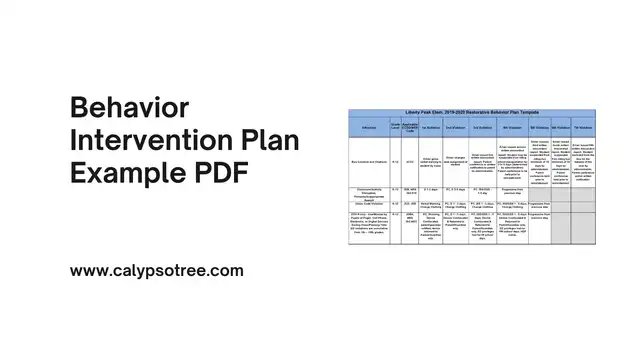Job description for an operations director! An Operations Director is a key leader in any company. They make sure everything runs smoothly. This role is important in many industries like manufacturing, healthcare, retail, and more.
What is an Operations Director?
An Operations Director is a key leader in a company. They make sure everything runs smoothly every day. They work in many industries like manufacturing, healthcare, retail, and more. Their job is to oversee all the daily activities and ensure the company operates efficiently. They manage teams, set goals, and solve problems to keep the company on track.
Operations Director Benefits
Having an Operations Director brings many benefits to a company:
- Better Efficiency: Operations Directors make processes better.
- Increased Productivity: By improving how things are done, Operations Directors help employees do their jobs faster and better. This means more work gets done in less time.
- Higher Profits: When the company runs better, it can make more money.
- Improved Quality: Operations Directors ensure the company’s products or services are top quality control.
- Strong Team Support: They provide the tools and resources teams need to do their jobs well.
- Goal Achievement: Operations Directors help set and meet company goals.
- Effective Budget Management: They keep an eye on the company’s finances.
- Future Planning: Operations Directors think about the future and make plans to help the company grow.
Main Duties of an Operations Director
They make sure the company runs smoothly every day. Here are the main tasks they handle:
- Overseeing Daily Operations: The Operations Director watches over all the daily activities of the company. If there are any problems, they fix them quickly.
- Implementing Company Policies: They make sure everyone follows the company’s rules and guidelines.
- Ensuring Operational Efficiency: The Operations Director looks for ways to make the company run better.
- Managing Teams: They lead and support different teams in the company. They make sure everyone works well together and meets their goals.
- Setting Goals and Targets: They help set goals for the company and make sure everyone is working towards them.
- Monitoring Performance: The Operations Director checks how well the company is doing.
- Budgeting and Financial Planning: They manage the company’s budget.
- Strategic Planning: The Operations Director helps plan for the future.
- Problem Solving: When problems arise, the Operations Director steps in to solve them.
- Ensuring Compliance: They make sure the company follows all laws and regulations.
The Operations Director has a big job with many tasks.
Qualifications Needed
To become an Operations Director, you need the right qualifications. Here are the key things you need:
- Educational Background: You should have a good education. Most Operations Directors have a degree. A degree in business is very helpful. Other related fields, like management or engineering, can also work.
- Relevant Certifications: Having certifications can give you an edge. Certifications show that you have special skills and knowledge. For example, a certification in project management or operations management can be very useful.
- Experience in Managing Operations: The most important qualification is experience. You need to have worked in operations before. This means you have handled different tasks and know how to manage them. Experience helps you understand how to run things smoothly.
- Leadership Skills: You need to be a good leader. This means you can guide and motivate your team.
- Communication Skills: You must be good at communicating. This means you can talk and write clearly. Good communication helps you explain your ideas and understand others.
- Problem-Solving Abilities: You need to be good at solving problems. Problem-solving skills help keep the company running smoothly.
- Time Management: You must manage your time well. This means you can handle many tasks and meet deadlines. Good time management keeps things on track.
- Financial Knowledge: Understanding finances is important. You need to know how to manage budgets and control costs.
- Technical Skills: Some technical skills can be useful too. This could mean understanding certain software or tools that help with operations.
- Teamwork: You must work well with others. This means you can collaborate and support your team. Good teamwork makes the company stronger.
Essential Skills for Operations Director
Here are the key skills they need:
Leadership Skills
They must be a strong leader. They need to guide their team’s leadership and ensure everyone works well together. Good leaders inspire and motivate their team to do their best.
Communication Skills
It is very important for students to be able to communicate well. They need to talk and write clearly, explain their ideas, and listen to others. Good communication helps avoid misunderstandings and keeps everyone on the same page.
Problem-Solving Skills
They must be good at solving problems. When things go wrong, they need to find solutions quickly. This helps keep the company running smoothly and avoids bigger issues.
Time Management
They have many tasks to handle each day, and they need to organize their time well to get everything done. Good time management helps them meet deadlines and stay on track.
Decision-Making Skills
They must make many decisions and choose the best options for the company. Good decision-making skills help them make smart choices quickly.
Organizational Skills
Being organized is very important. They need to keep everything in order. This helps them manage tasks and track what needs to be done.
Adaptability
Things can change quickly in a company, so employees need to be adaptable. This means they can handle changes and adjust their plans as needed.
Teamwork
They work with many people, so they need to be good at teamwork. This means working well with others and supporting their team.
Analytical Skills
Analyzing data is a big part of the job. They must look at numbers and reports to understand how the company is doing. Good analytical skills help them make better decisions.
Technical Skills
Knowing how to use certain software and tools can be helpful. Technical skills help Them manage operations more efficiently.
They need strong leadership, communication, and problem-solving skills. They must also manage their time well and make good decisions. Being organized, adaptable, and a good team player are also important.
Contribution to Company Success
Here’s how they help:
- Streamlining Processes: Operations Directors find ways to improve the company’s performance. They ensure tasks are done in the best possible way, saving time and effort.
- Increasing Productivity: Improving processes They help the company get more work done in less time. This means employees can do their jobs better and faster.
- Improving Profits: The company can make more money when things run better and faster. They help reduce waste and save costs, leading to higher profits.
- Enhancing Quality: They ensure the company’s high-quality products or services. They make sure standards are met, which keeps customers happy and can lead to more sales.
- Supporting Employees: They support their teams by providing the tools and resources to do their jobs well. Happy and well-supported employees are more productive and help the company succeed.
- Setting and Meeting Goals: They help set company goals and work hard to achieve them. Achieving these goals helps the company grow and succeed.
- Managing Budgets: They monitor the company’s finances. By managing budgets well, they ensure the company spends wisely and stays financially healthy.
- Planning for the Future: They think about the future and plan to help the company grow. They look for new opportunities and ways to improve.
Career Path
Becoming an Operations Director usually starts with an entry-level job. Here’s how it works:
- Starting with Entry-Level Jobs: Most begin in entry-level positions. These jobs help them learn about the company and its operations. They might work as assistants or junior managers.
- Gaining Experience: As they gain experience, they take on more responsibilities. They learn to manage tasks, solve problems, and work with a team. Experience is very important for growing in this career.
- Proving Their Skills: To move up, they must prove their skills. This means doing their job well and showing they can handle more complex tasks. They might take on special projects or help improve processes.
- Getting Promotions: With experience and proven skills, they get promoted to higher positions. These jobs might include roles like Operations Manager or Senior Manager.
- Becoming an Operations Director: After many years of hard work and learning, they can become an Operations Director. They now oversee larger parts of the company and make important decisions.
- Opportunities for Further Growth: Even as an Operations Director, there are chances to grow. They might move into executive positions like Vice President of Operations or Chief Operating Officer (COO). These roles have even more responsibilities and require strong leadership.
The career path of an Operations Director starts with entry-level jobs. With experience and skill, they move up through promotions. There are many opportunities to grow further, possibly into top executive positions.
Team and Department Management
Managing teams is a big part of an Operations Director’s job. Here’s what they do:
- Leading Teams: They lead different teams in the company. They make sure everyone knows their tasks and works together well.
- Motivating Their Team: They know how to motivate their team. They encourage everyone to do their best and reach their goals. This helps the team stay focused and productive.
- Ensuring Departments Work Well Together: There are many departments in a company, like sales, marketing, and production. They ensure these departments work well together. They coordinate activities and share information to avoid problems.
- Resolving Conflicts: Sometimes, conflicts happen in a team or between departments. The Operations Director steps in to resolve these conflicts. They listen to both sides and find fair solutions. This helps keep the work environment positive and productive.
- Providing Support and Resources: They ensure their team has what they need to do their jobs well. This includes providing training, tools, and other resources. Supporting their team helps improve performance and achieve company goals.
- Monitoring Performance: They monitor how well the teams and departments are doing. They use reports and data to check if targets are being met. If there are issues, they find ways to improve performance.
Managing teams and departments is crucial to an Operations Director’s job. They lead and motivate their teams, ensure departments work well together and resolve conflicts. They help the company achieve its goals by providing support and monitoring performance.
Common Challenges
Here are some of the main ones:
- Managing Changes: Things can change quickly in a company. New technologies, market shifts, or company growth can all cause changes. An Operations Director needs to manage these changes smoothly.
- Handling Crises: Sometimes, unexpected problems or crises happen. These could be supply chain disruptions, equipment failures, or emergencies.
- Meeting Performance Targets: A big part of their job is meeting performance targets. These are goals set by the company to measure success. The Operations Director works hard to ensure the company meets or exceeds these targets. If targets are not met, they find ways to improve performance.
- Balancing Budgets: Managing the company’s budget is another challenge. They need to make sure the company spends money wisely.
- Keeping Up with Industry Trends: Industries are always changing, and new trends emerge. They must stay updated with these trends. This helps them make informed decisions and keep the company competitive.
- Coordinating Departments: Getting different departments to work together can be challenging. They ensure all departments communicate well and collaborate effectively.
Role in Strategic Planning
Here’s what they do:
- Long-Term Planning: They help plan for the future. They look at where the company wants to be in the long run.
- Setting Goals: They work with other leaders to set strategic goals for the company. These goals guide the company’s direction and efforts. They make sure these goals are clear and achievable.
- Aligning Operations with Strategy: Daily operations must match the company’s overall business strategy. They ensure this alignment. They make sure every task and project supports the company’s big-picture goals.
- Improving Processes: Part of strategic planning is finding ways to improve. They look for ways to make processes better and more efficient. This helps the company grow and succeed.
- Monitoring Progress: They keep track of how well the company is doing. They use data and reports to see if the company is on track to meet its goals. If there are any issues, they adjust the plans as needed.
- Collaborating with Leaders: Strategic planning involves working with other leaders. They collaborate with executives and department heads.
Sample Job Description for an Operations Director
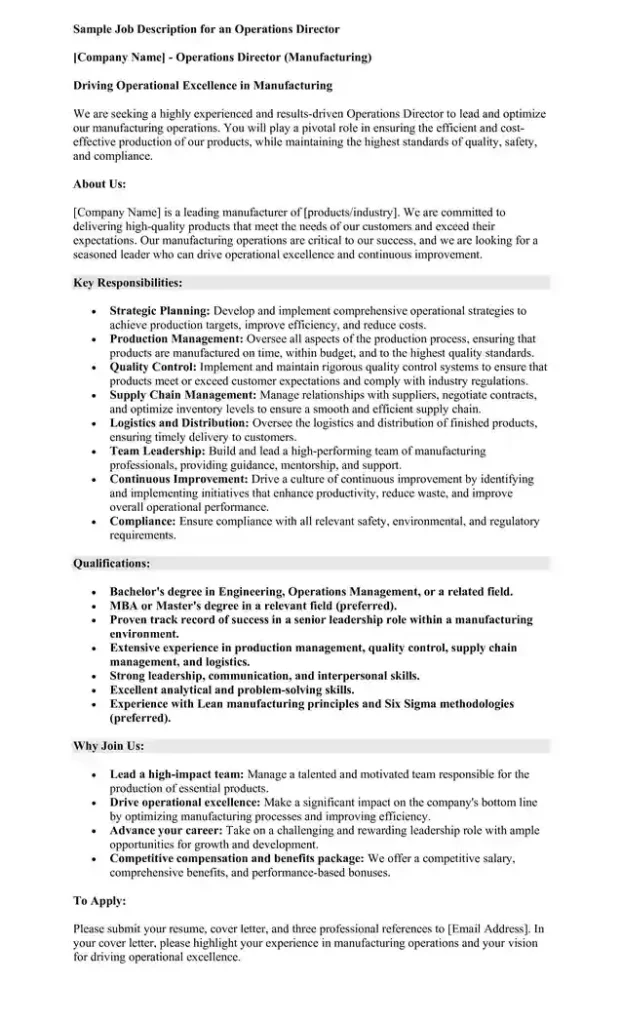
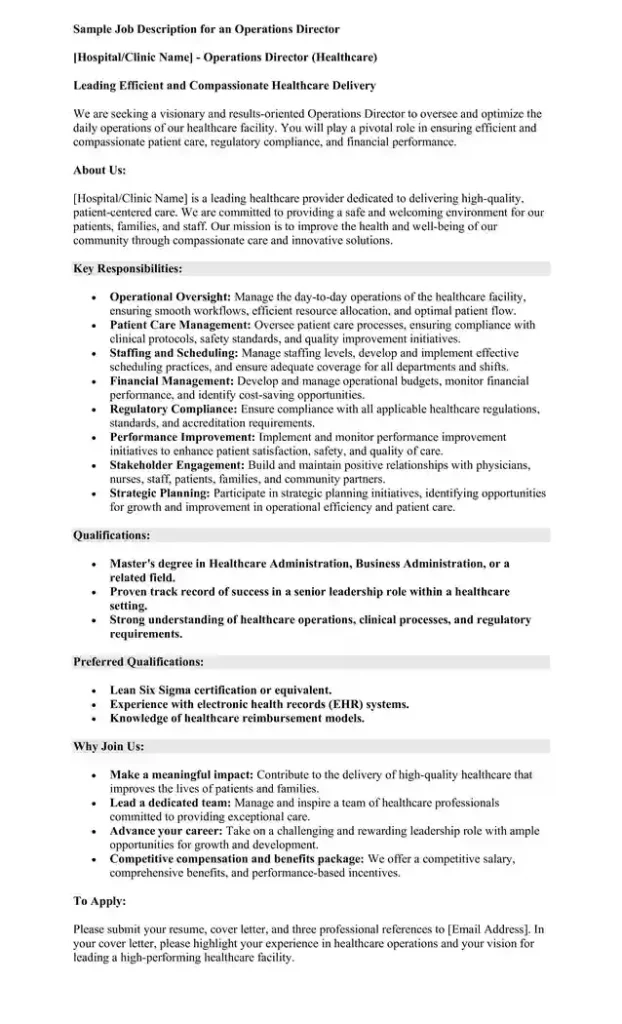
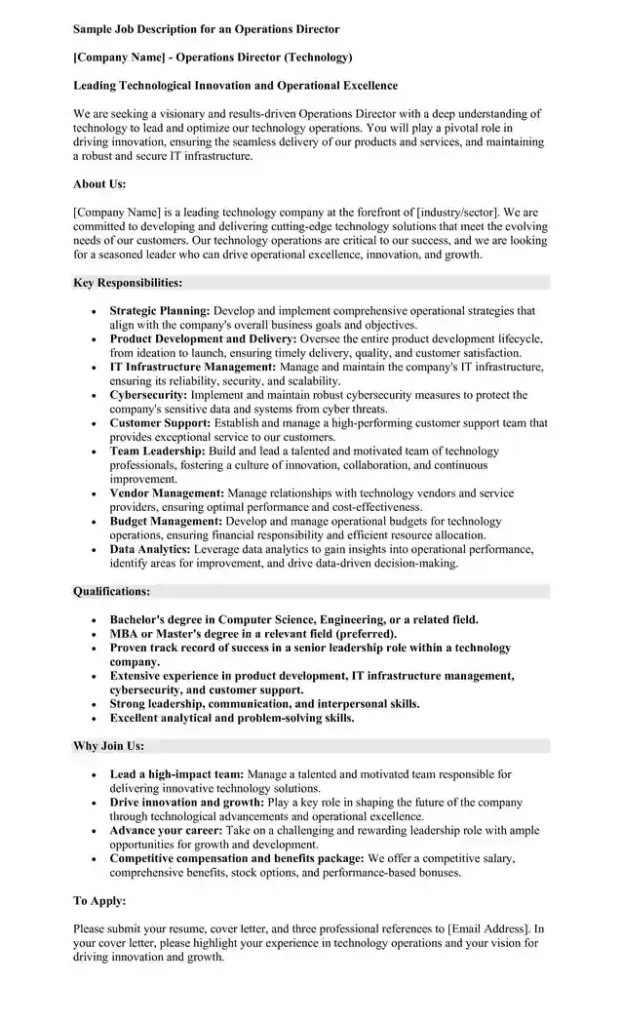
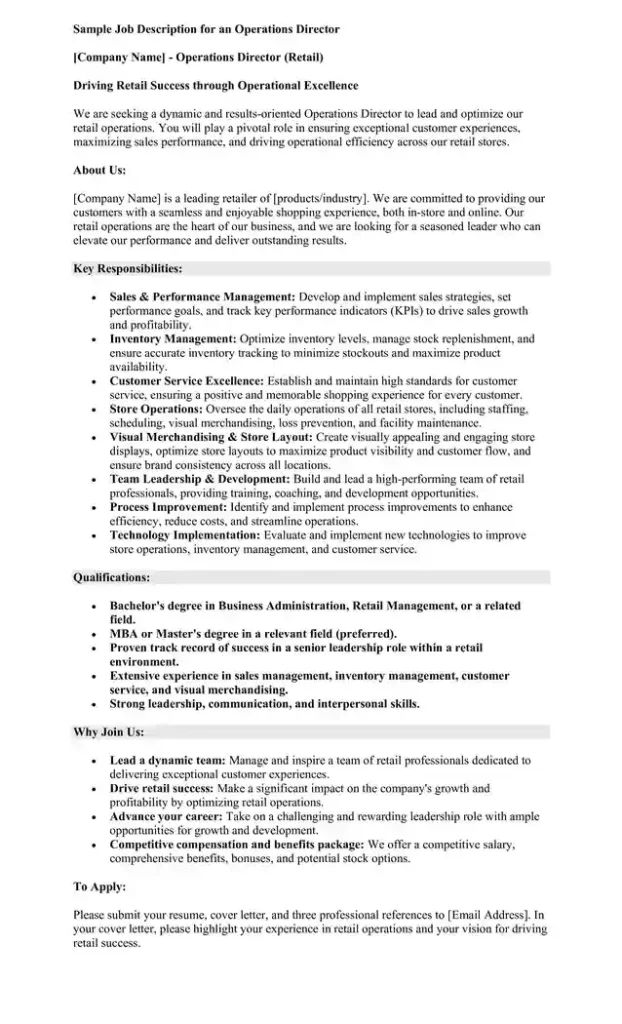
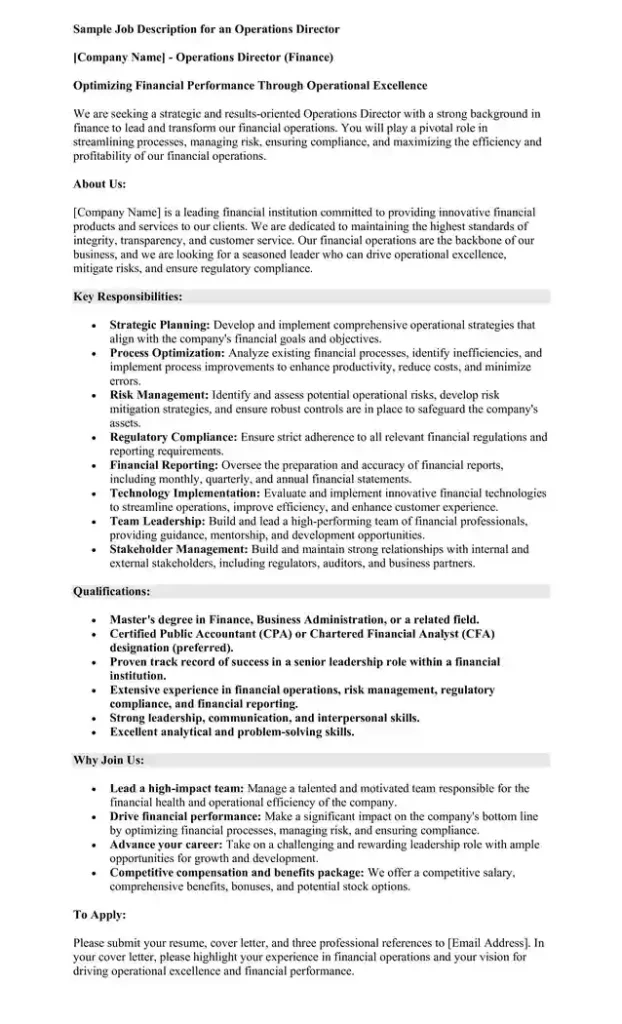
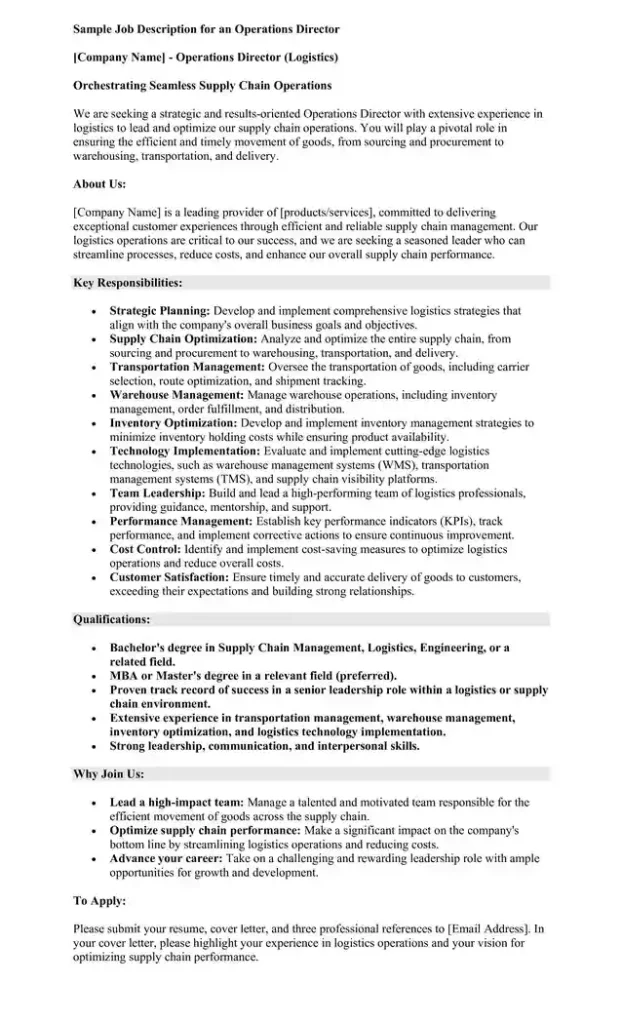
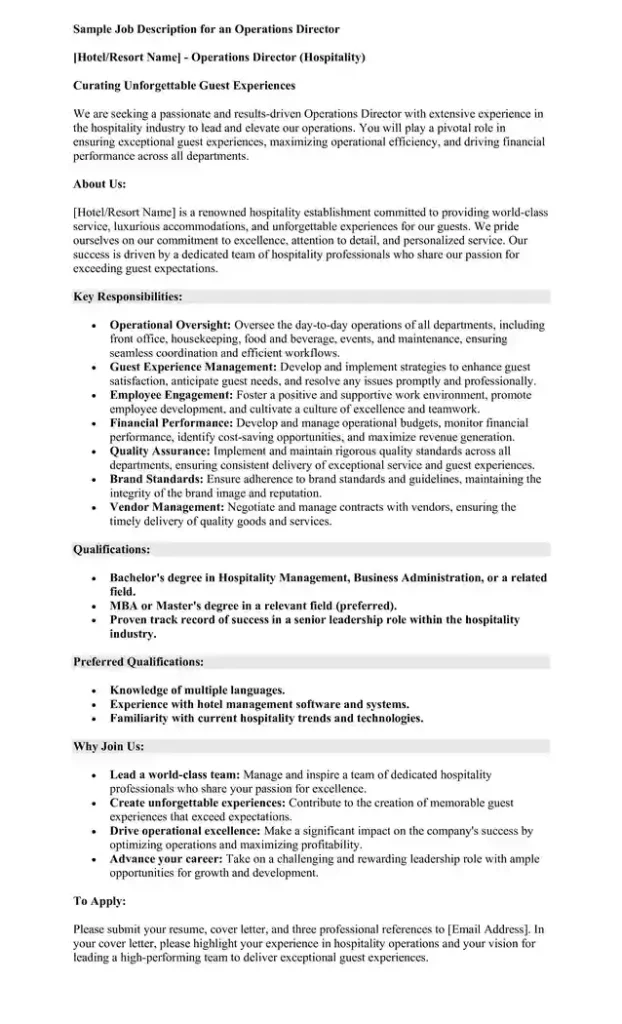
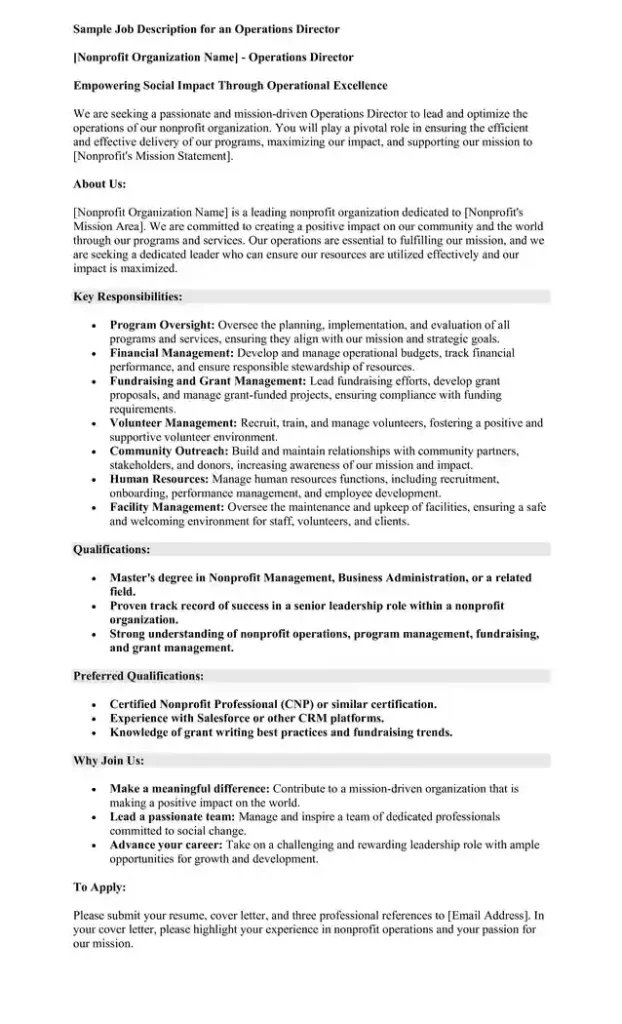
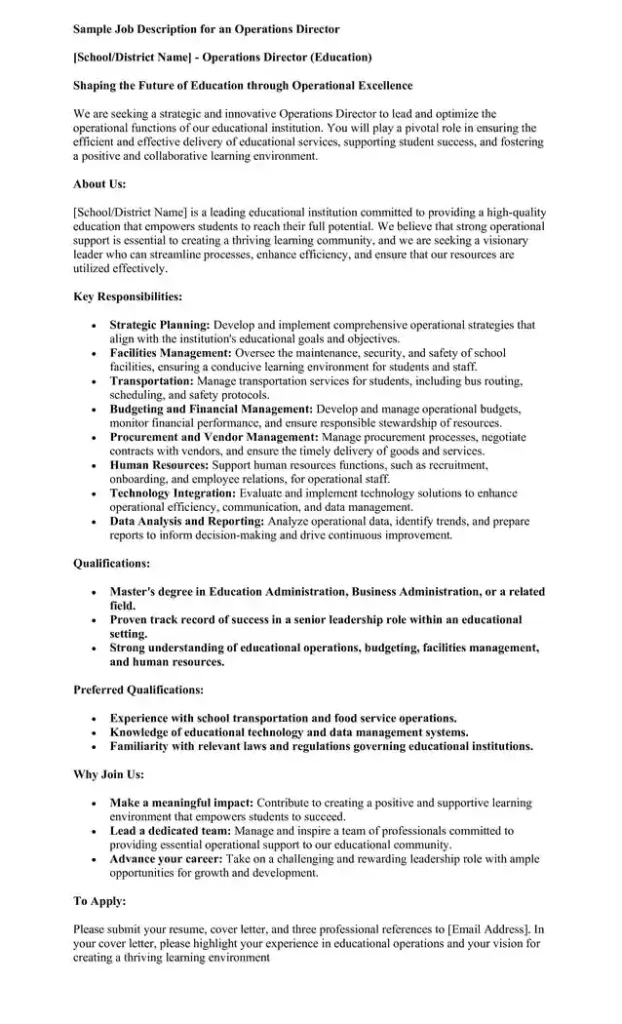
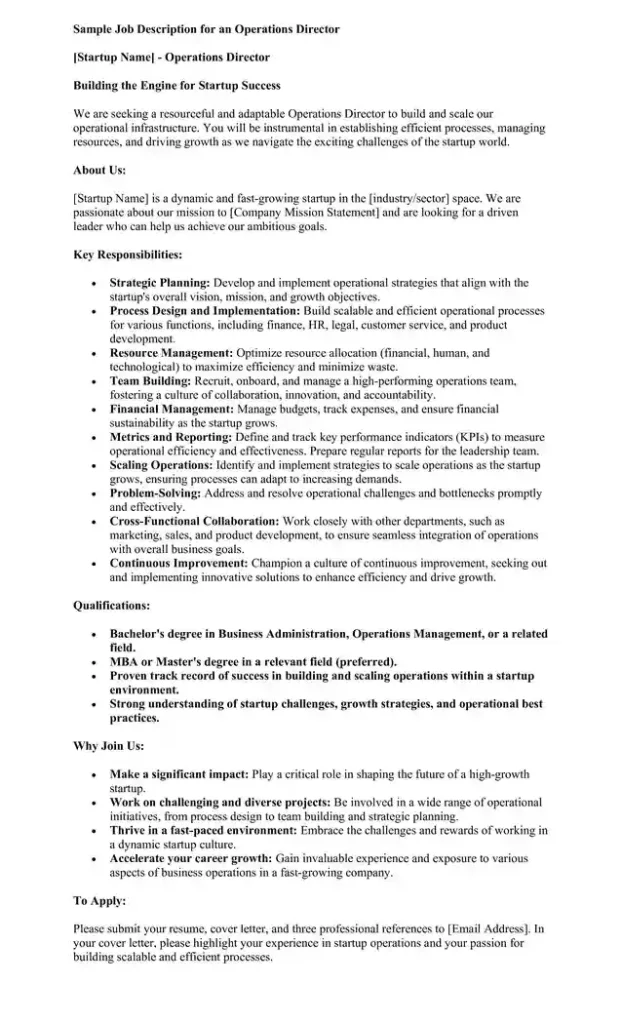
Budgeting and Financial Planning
It is a very important job for an Operations Director. Here’s what they do:
Keeping Costs Under Control
Operations Directors ensure the company does not spend too much money.
Planning for Future Financial Needs
They also plan for the future. This means thinking about what the company will need later on and making sure there is enough money to cover those needs.
Forecasting Financial Performance
Operations Directors predict the company’s financial performance. They analyze data and trends to guess future profits and expenses.
Managing the Budget
They manage the company’s budget, which means deciding how much money to spend on salaries, equipment, and supplies.
Monitoring Spending
Operations Directors keep an eye on how money is being spent. They make sure that spending stays within the budget. If there are any problems, they fix them quickly.
Reporting Financial Results
They report the company’s financial results to other leaders. This means sharing information about profits, costs, and plans. Good reporting helps everyone understand how the company is doing.
Industries Employing Operations Directors
Operations Directors can work in many different industries. Here are some examples:
- Manufacturing:Operations Directors ensure products are made efficiently and safely. They oversee the production process improvement and improve operations.
- Healthcare:In healthcare, they manage hospital or clinic operations.
- Retail:In retail, Operations Directors oversee stores and ensure their smooth operation. They manage staff, inventory, and customer service to keep the store successful.
- Technology:In technology companies, they manage the development and delivery of tech products.
- Logistics:In logistics, Operations Directors manage the transportation and storage of goods. They ensure products get to where they need to be, on time and in good condition.
Operations Director Salary Estimates
The salary for an Operations Director can vary based on location, industry standards, and experience. Here are some estimates from reputable sources:
- Salary.com Operations Directors in the United States can earn between 0,000 and 0,000 per year. Source: Salary.com
- Glassdoor Glassdoor reports that Directors of Operations in the United States have a salary range of 0,000 to 0,000 per year. Source: Glassdoor
- Indeed According to Indeed, Directors of Operations in California can make between ,000 and 0,000 per year. Source: Indeed
- Built In Chicago In Chicago, IL, the salary for a Director of Operations ranges from 0,000 to 0,000 per year. Source: Built In Chicago
These estimates show that the salary can vary widely. Location, industry, and experience all play a part in how much they can earn. For more detailed information, you can visit the following sources: Salary.com, Glassdoor, Indeed, and Built In Chicago.
Conclusion
The job description for an Operations Director highlights their vital role in any company. They ensure everything runs efficiently and help the company achieve its goals. With the right skills and experience, it can be a very rewarding career. With the right skills and experience, it can be a very rewarding career.

Alexander is a skilled HR expert who writes clear and compelling job descriptions. He has spent over 15 years in the HR field, helping companies find and keep the best employees. With a degree in Human Resources Management from the University of Chicago, he has the knowledge to back up his experience.







